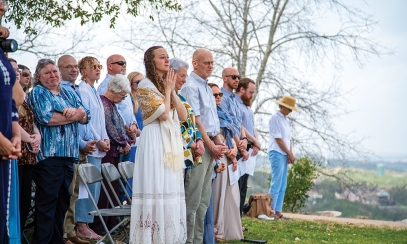
May our Lenten sacrifice be one of love
Out for dinner one Friday last fall, our disabled son Gabe suggested, “Let’s have catfish to celebrate Lent!” His comment brought a smile because it was still Halloween time and we had not even reached Advent. In Gabe’s remark, I could see evidence of lifelong Catholic patterns, but were those mere habits of cultural Catholicism or something deeper?
Out for dinner one Friday last fall, our disabled son Gabe suggested, “Let’s have catfish to celebrate Lent!” His comment brought a smile because it was still Halloween time and we had not even reached Advent. In Gabe’s remark, I could see evidence of lifelong Catholic patterns, but were those mere habits of cultural Catholicism or something deeper?
One answer may come from how we handled the dilemma posed by Ash Wednesday falling on Valentine’s Day, Feb. 14. Celebrating with flowers, chocolate or jewelry like the ambient culture prescribes, or keeping the solemn day of penance and fasting? At our house, we blended our observance of Valentine’s Day with Mardi Gras and kept Ash Wednesday intact. But I’m not sure that compromise is what the prophet Joel really called for in exhorting us, “Rend your hearts, not your garments.” (Jl 2:13)
Does our practice of the Catholic faith consist of merely going through the motions of organized religion, or does it reflect a personal, committed relationship with Christ — evident in our devotional life and showing others his grace and mercy? It’s an ages-old question as fresh today as when Joel wrote over 500 years before Christ.
By rending our hearts, I don’t think Joel meant heroic self-mortification for its own sake, like giving up chocolate or alcohol. I think he meant sacrificing, out of love. Like sitting vigil all day with a sick friend or family member in surgery. Like praying daily for a loved one who’s making a special trip or going through a hard time. Like writing a letter or email to an old friend you haven’t seen in years. Like driving hundreds of miles to bring a son or daughter home from college. Like picking up the phone and reestablishing connection with someone you’ve offended.
Contemporary retreat programs like Christ Renews His Parish and ACTS call for peer witnessing. Yet while the retreatant is giving personal testimony, a designated “prayer warrior” remains in a separate room away from the action, praying for that person in support of their evangelization effort. Some of the most powerful moments I have experienced on these retreats have come while praying — sometimes pleading and crying — to carry the pain of the speaker so their talk may reach its intended mark.
Returning to catfish, here’s an idea. What if we patronize the Knights of Columbus fish fries — they support many worthy causes — but with a twist. We could order the meals to go, then find some recipients for the hot food (homeless individuals or homebound parishioners). Then continue our fast and return to church Stations of the Cross. There’s a Lenten trifecta: almsgiving, fasting and prayer.
On an empty stomach, we might identify a bit more with our Savior’s pain on the way to Calvary. By sitting vigil with him as he sacrifices and rends his Sacred Heart for us, the remarkable gift of salvation that resulted will taste all the sweeter.
Louis A. Gamino is a clinical psychologist at Baylor Scott White Health and a member of St. Luke Parish in Temple. Find more about him at www.LouisGamino.com.



